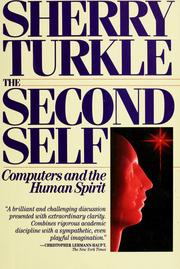| Listing 1 - 7 of 7 |
Sort by
|

ISBN: 0671468480 9780671468484 Year: 1984 Publisher: New York (N.Y.) : Simon and Schuster,
Abstract | Keywords | Export | Availability | Bookmark
 Loading...
Loading...Choose an application
- Reference Manager
- EndNote
- RefWorks (Direct export to RefWorks)
Computers --- Electronic data processing --- Ordinateurs --- Informatique --- Psychological aspects --- Aspect psychologique --- Computers. --- Psychological aspects. --- Electronic data processing - Psychological aspects

ISBN: 9780262201681 0262201682 9780262516778 0262516772 Year: 2011 Publisher: Cambridge: MIT Press,
Abstract | Keywords | Export | Availability | Bookmark
 Loading...
Loading...Choose an application
- Reference Manager
- EndNote
- RefWorks (Direct export to RefWorks)
In Evocative Objects, the author collects writings by scientists, humanists, artists, and designers that trace the power of everyday things. These essays reveal objects as emotional and intellectual companions that anchor memory, sustain relationships, and provoke new ideas
Transitional objects (Psychology) --- Objets transitionnels --- MAD-faculty 14 --- objecten --- psychologie --- designtheorie
Book
ISBN: 9780465010219 9780465022342 9780465031467 9781459609020 Year: 2011 Publisher: New York, N.Y. Basic Books
Abstract | Keywords | Export | Availability | Bookmark
 Loading...
Loading...Choose an application
- Reference Manager
- EndNote
- RefWorks (Direct export to RefWorks)
In "Alone Together, " MIT technology and society professor Sherry Turkle explores the power of our new tools and toys to dramatically alter our social lives. It's a nuanced exploration of what we are looking for--and sacrificing--in a world of electronic companions and social networking tools, and an argument that, despite the hand-waving of today's self-described prophets of the future, it will be the next generation who will chart the path between isolation and connectivity.
Sociology of culture --- Computer. Automation --- Social psychology --- Human-computer interaction --- Information technology --- Interpersonal relations --- #SBIB:309H103 --- Human relations --- Interpersonal relationships --- Personal relations --- Relations, Interpersonal --- Relationships, Interpersonal --- Social behavior --- Object relations (Psychoanalysis) --- Computer-human interaction --- Human factors in computing systems --- Interaction, Human-computer --- Human engineering --- User-centered system design --- User interfaces (Computer systems) --- Social aspects --- Mediatechnologie / ICT / digitale media: sociale en culturele aspecten --- Human-computer interaction. --- Interpersonal relations. --- Social aspects. --- Technologie de l'information --- Relations humaines --- Interaction homme-machine (Informatique) --- Aspect social
Book
ISBN: 9780143109792 9781594205552 9781101980460 110198046X 1594205558 0143109790 Year: 2016 Publisher: New York Penguin
Abstract | Keywords | Export | Availability | Bookmark
 Loading...
Loading...Choose an application
- Reference Manager
- EndNote
- RefWorks (Direct export to RefWorks)
Preeminent author and researcher Sherry Turkle has been studying digital culture for over thirty years. Long an enthusiast for its possibilities, here she investigates a troubling consequence: at work, at home, in politics, and in love, we find ways around conversation, tempted by the possibilities of a text or an email in which we don't have to look, listen, or reveal ourselves. We develop a taste for what mere connection offers. The dinner table falls silent as children compete with phones for their parents' attention. Friends learn strategies to keep conversations going when only a few people are looking up from their phones. At work, we retreat to our screens although it is conversation at the water cooler that increases not only productivity but commitment to work. Online, we only want to share opinions that our followers will agree with - a politics that shies away from the real conflicts and solutions of the public square. The case for conversation begins with the necessary conversations of solitude and self-reflection. They are endangered: these days, always connected, we see loneliness as a problem that technology should solve. Afraid of being alone, we rely on other people to give us a sense of ourselves, and our capacity for empathy and relationship suffers. We see the costs of the flight from conversation everywhere: conversation is the cornerstone for democracy and in business it is good for the bottom line. In the private sphere, it builds empathy, friendship, love, learning, and productivity. But there is good news: we are resilient. Conversation cures. Based on five years of research and interviews in homes, schools, and the workplace, Turkle argues that we have come to a better understanding of where our technology can and cannot take us and that the time is right to reclaim conversation. The most human--and humanizing--thing that we do. The virtues of person-to-person conversation are timeless, and our most basic technology, talk, responds to our modern challenges. We have everything we need to start, we have each other.
Mass communications --- Sociology of culture --- Cell phones and teenagers. --- Internet addiction. --- Internet and teenagers. --- Neue Medien. --- Zwischenmenschliche Beziehung. --- Internet et adolescents --- Cyberdépendance --- Médias numériques --- Internet and teenagers --- Cell phones and teenagers --- Internet addiction --- Téléphones cellulaires et adolescents --- Téléphones cellulaires et adolescents --- Cyberdépendance --- Conversation --- Communication --- Online social networks --- Social interaction --- Digital media --- Technological innovations --- Social aspects --- Conversation. --- Online social networks. --- Social interaction. --- Technologies de l'information et de la communication --- Réseautage personnel (Informatique) --- Interaction sociale --- Médias numériques --- Technological innovations. --- Social aspects. --- Aspect social --- #SBIB:309H103 --- #SBIB:309H504 --- #SBIB:309H505 --- Communication Programs --- Communications Personnel --- Misinformation --- Personal Communication --- Communication Program --- Communication, Personal --- Personnel, Communications --- Program, Communication --- Programs, Communication --- Addiction, Internet --- Addiction to the Internet --- Addictive use of the Internet --- Compulsive Internet use --- Compulsive behavior --- Cellular telephones and teenagers --- Teenagers and cell phones --- Teenagers --- Teenagers and the Internet --- Human interaction --- Interaction, Social --- Symbolic interaction --- Exchange theory (Sociology) --- Psychology --- Social psychology --- Electronic social networks --- Social networking Web sites --- Virtual communities --- Social media --- Social networks --- Sociotechnical systems --- Web sites --- Talking --- Colloquial language --- Etiquette --- Oral communication --- technological innovations --- Mediatechnologie / ICT / digitale media: sociale en culturele aspecten --- Code en boodschap: sociologische, antropologische benadering --- Code en boodschap: psychologische, psycho-analytische benadering --- Social Communication --- Communication, Social --- Communications, Social --- Social Communications --- Digitalisering --- ICT --- Communicatie --- Psychologie --- Maatschappij --- Communities, Online (Online social networks) --- Communities, Virtual (Online social networks) --- Online communities (Online social networks) --- Communication - Technological innovations --- Digital media - Social aspects
Book
ISBN: 0297815148 9780297815143 Year: 1996 Publisher: London: Weidenfeld,
Abstract | Keywords | Export | Availability | Bookmark
 Loading...
Loading...Choose an application
- Reference Manager
- EndNote
- RefWorks (Direct export to RefWorks)
Computer networks --- Computers and civilization --- Réseaux d'ordinateurs --- Ordinateurs et civilisation --- Psychological aspects --- Aspect psychologique --- 621.391 --- 681.2 --- #SBIB:309H1720 --- 316.37 --- 316.37 Identiteit. Individu en maatschappij. Persoonlijkheid --- Identiteit. Individu en maatschappij. Persoonlijkheid --- 681.2 Instrument-making in general. Instrumentation. Measuring instruments and their manufacture. Balances. Weighing devices --- Instrument-making in general. Instrumentation. Measuring instruments and their manufacture. Balances. Weighing devices --- 621.391 General questions of electrical communication engineering. Cybernetics. Information theory. Signal theory --- General questions of electrical communication engineering. Cybernetics. Information theory. Signal theory --- Informatiekunde, informatie management --- Computer architecture. Operating systems --- Mass communications --- Historische en vergelijkende pedagogiek. --- Psychological aspects. --- Computer networks - Psychological aspects
Book
ISBN: 9782915830910 2915830916 Year: 2015 Publisher: Paris: L'échappée,
Abstract | Keywords | Export | Availability | Bookmark
 Loading...
Loading...Choose an application
- Reference Manager
- EndNote
- RefWorks (Direct export to RefWorks)
Comment les nouvelles technologies ont-elles redessiné le paysage de nos vies affectives et de notre intimité ? Telle est la question centrale de 'Seuls ensemble'. Pour y répondre, l'anthropologue Sherry Turkle a étudié pendant quinze ans nos relations avec les objets technologiques. Elle a observé chez les utilisateurs de robots de compagnie une tendance à les considérer comme vivants et à se laisser duper par leurs réactions préprogrammées. Un nouveau fantasme est ainsi en train d'émerger, où des substituts technologiques, sûrs et sans surprises, pourraient bientôt remplacer les relations interpersonnelles, éprouvantes et imparfaites. Elle a constaté qu'une dynamique similaire était à l'œuvre dans nos rapports aux nouvelles technologies en général. L'ultra-connectivité s'accompagne de comportements compulsifs qui mettent en péril les bienfaits d'une certaine solitude, nécessaire à la construction de soi. Ses enquêtes sur les adolescents révèlent leur dépendance accrue aux smartphones et leur tendance à préférer les interactions médiatisées à celles en tête à tête — considérées comme trop risquées et et trop exigeantes. Ce livre captivant a eu un grand retentissement aux États-Unis, car il montre, preuves à l'appui, comment nous nous coupons de ce qui est au fondement de toute relation humaine : l'altérité et sa part d'imprévisibilité, de risques et de plaisirs, à jamais inaccessibles à des systèmes informatiques
Communication --- Technologies de l'information et de la communication --- Technological innovations --- Social aspects --- Psychological aspects --- Aspect social --- Aspect psychologique --- Nouvelles technologies de l'information et de la communication --- Aspect social. --- Aspect psychologique. --- Information technology --- Interpersonal relations --- Human-computer interaction --- Information technology - Social aspects
Book
Abstract | Keywords | Export | Availability | Bookmark
 Loading...
Loading...Choose an application
- Reference Manager
- EndNote
- RefWorks (Direct export to RefWorks)
Computers --- Electronic data processing --- Psychological aspects
| Listing 1 - 7 of 7 |
Sort by
|

 Search
Search Feedback
Feedback About UniCat
About UniCat  Help
Help News
News